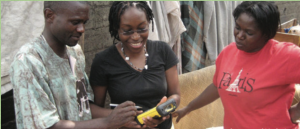Examining disease-specific programmes
Vaccination programmes – research on the interface between health systems and vaccination programmes by Sandra Mounier-Jack and Tracey Chantler has included a qualitative study on how the recent NHS reform has affected the delivery of the immunisation programme in the UK, identifying current systems fragmentation as a fundamental problem. Together with PATH, Deborah Watson- Jones, Katherine Gallagher, Sandra Mounier-Jack, and Natasha Howard led the first comprehensive review of lessons learned from Human papilloma virus (HPV) vaccine delivery experiences across 46 countries, examining planning, communication, deliver y, achievements and sustainability, and identifying the pitfalls informing Global Alliance for Vaccines and Immunisation’s strategic work on HPV vaccine introduction.
Tuberculosis (TB) control and health systems – the Communicable Diseases Policy Research Group led by Richard Coker with Mishal Khan, James Rudge and colleagues, has worked closely with national TB control programs to conduct epidemiological studies to evaluate and inform tuberculosis control policies and systems in China, Myanmar and Cambodia. These studies have investigated whether prolonged delays to diagnosis of TB persist even when global case detection targets are being met and whether weaknesses in primary public health services may contribute to emergence of drug resistant TB.
James Rudge is working at the interface of health systems and livestock production systems analysing risk and pandemic influenza in Cambodia. Also working on pandemic preparedness, Liz Speakman is evaluating governance arrangements across the EU.
Cardiovascular disease in Russia: strengthening evidence about causes, mechanisms, prevention and treatment has focused on Russia which has one of the highest burdens of cardiovascular disease in the world. Working in 13 cities across Russia, a team coordinated by Martin McKee and David Leon have examined the management of individual patients with heart attacks, looking at their contacts with the health system before their acute illness, and their management in hospital and subsequently. They track how considerable progress has been made, with increasing number of patients getting rapid access to revascularisation. Work at national level is focused on understanding how best to bring about change in Russian hospitals, to ensure that good practice developed in one place can be adopted elsewhere.
Integrated health systems for the prevention of malaria in pregnancy and infancy – Katherine Theiss-Nyland and Jo Lines have explored strategies for strengthening the policies and implementation systems for distributing insecticide treated nets used for malaria prevention; specifically examining the opportunities to integrate routine health services, especially giving
nets to pregnant women through antenatal clinics and to infants through immunisation services. Some key findings include the under-supply of nets to these distribution channels, and the lack of integrated monitoring and evaluation for integrated health services.
De-worming strategies in Kenya (TUMIKIA) funded by DFID / MRC / Wellcome Trust Joint Global Health Trials led by Rachel Pullan with Dina Balabanova and Mishal Khan, recognises that disease specific programmes are often implemented in isolation, and are donor-dependent and unsustainable. Research is underway to interpret the findings of a cluster randomised trial of school-based deworming compared with deworming delivered by community health workers to interrupt the transmission of soil- transmitted helminths in Kenya. The research examines the health system barriers and facilitators to implementing the two treatment models, in the context of currently promoted decentralisation, exploring the feasibility and sustainability of different programme configurations, governance and stakeholder relationships.
The Centre for Global Mental Health is an international centre of excellence in mental health systems research,
run jointly by the London School of Hygiene & Tropical Medicine and King’s College London Institute of Psychiatry, Psychology and Neurosciences. Members have conducted studies on how best to scale up services in order to increase access to quality mental health services to suit Nigeria’s unique health infrastructure, mixed-methods implementation research to identify best practices in mental health information systems and monitoring and evaluation in sub-Saharan Africa. PRIME is a research collaboration investigating the integration of mental health into primary care in Ethiopia, India, Nepal, South Africa, Uganda, through a combination of formative research, district level implementation research, and large- scale implementation research following scale-up to multiple districts.
A body of work on health systems challenges in responding to violence against women in Europe, North America, South-East Asia and sub- Saharan Africa has been developed by Gender Violence and Health Centre members Manuela Colombini, Susannah Mayhew, Loraine Bacchus and others, and also draws together different disciplines including clinicians, health systems analysts and other social scientists. Researchers have undertaken HPSR evaluations of the appropriateness of different intervention models: One Stop Crisis Centres in Malaysia, health policy analysis of the integration of intimate partner violence into antenatal care settings and health policies in Nepal and Sri Lanka and evaluation of a brief counselling intervention for partner violence in ANC services in South Africa.


